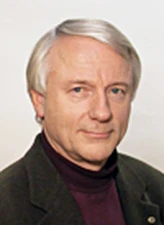Rickard N.A. Lundin

The 2008 Hannes Alfvén Medal is awarded to Rickard N.A. Lundin for his outstanding contributions to the advancement of measurement techniques for space plasma and the important new knowledge that has been generated by these new measurements.
Rickard N. A. Lundin received his Ph D. in Space Physics from the University of Umeå, Sweden in 1977 and joined Kiruna Geophysical Institute as Staff Scientist. In 1988 he became Professor of Space Plasma Physics at the Swedish Institute of Space Physics and at the University of Umeå and Assistant Director of the Swedish Institute of Space Physics. He served as Director of the institute 1994 – 2003 and is since then Head of the institute’s Solar-Terrestrial Physics Research Program.
In 1983 Lundin received the Wallmark Award of the Royal Swedish Academy of Sciences, and in 1990 he was elected Member of the Academy. He is also a full member of the International Academy of Astronautics.
Rickard Lundin’s Ph.D. thesis dealt with acceleration of auroral energetic electrons and was based on results from sounding rocket experiments. He became the leader of the Institute’s development of advanced instruments for measurement of the distribution functions and mass compositions of space plasma and is a world leading expert in that field. He was PI for hot plasma experiments on nine sounding rockets in the period 1972-80 and has been PI for a large number of advanced mass separating satellite-borne particle experiments on Prognos 7 and 8, Viking, INTERBALL, Phobos, missions to Mars, Planet-B, the comet mission Rosetta and ESA’s Mars Express. He was Project Scientist for the Swedish-German satellite project Freja.
The scientific results of the space projects that Rickard Lundin has led include the first data on the composition and energy distribution of the plasma in the boundary regions of the Earth’s magnetosphere at high latitudes. His instrument on Phobos 2 gave the first data of the composition of the plasma around Mars. He also showed that oxygen ions are leaving the planet at a rate indicating that the Martian atmosphere would be blown away by the solar wind in a period of the order 100 million years, if the loss rate would be the same as measured by Phobos 2. A strong out-gassing from the planet is thus needed to keep an atmosphere. A number of acceleration mechanisms have been identified and studied by him and his co-workers primarily in the Viking data. He has also investigated interaction processes between the solar wind and the magnetosphere at the magnetopause and its boundary layer. Rickard Lundin’s scientific work makes him a world-leading experimentalist in the field of space plasma properties.
